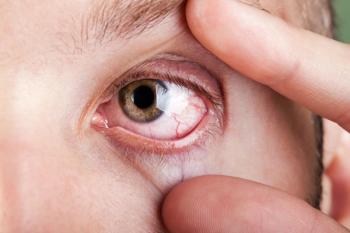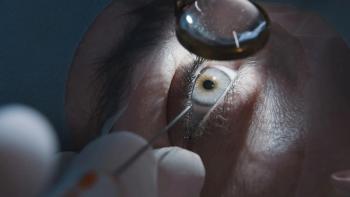
The consequences of dry eye: Increased incidence of psychiatric disorders, fibromyalgia and chronic fatigue following diagnosis
Dry eye increases susceptibility to psychiatric disorders and chronic pain syndromes, investigators reported at the 2024 American Academy of Ophthalmology meeting.
Reviewed by Gavin Li, MS.
The consequences of dry eye can extend well past the physical limits of the eyeball, according to Gavin Li, MS. Dry eye significantly increases the risk of developing depression, anxiety, fibromyalgia and chronic fatigue, suggesting that dry eye may serve as an early indicator or cause of psychological distress, he reported. Mr Li, from the Icahn School of Medicine at Mount Sinai, New York, presented the findings of his group1 at the 2024 American Academy of Ophthalmology annual meeting in Chicago.
Although the link between dry eye and psychiatric conditions is well-documented, no longitudinal studies have explored the direction of this relationship. To address this gap in the literature, Mr Li and his colleagues assessed whether a new diagnosis of dry eye increases the risk of developing depression, anxiety, fibromyalgia and chronic fatigue compared to those without dry eye.
They used a US-wide Medicare sample to identify individuals who did not have a history of dry eye, fibromyalgia, chronic fatigue or a psychiatric diagnosis. Individuals who developed dry eye from 2012 to 2015 were identified and matched with a control group without dry eye by age, sex, and race, Mr Li recounted.
Dry eye increases susceptibility to psychiatric disorders and chronic pain syndromes
The authors identified 18,807 individuals without dry eye and 4,702 with dry eye.
The analysis showed that individuals with dry eye were 1.65 times more likely to develop depression, 1.62 times more likely to develop anxiety, 2.41 times more likely to develop fibromyalgia and 1.5 times more likely to develop chronic fatigue (P < 0.001, P < 0.001, P < 0.001, and P = 0.02, respectively).
The investigators point to aspects of previous studies that support their findings, including a strong negative association between dry eye severity and both quality of life and mental health survey scores.2,3
“Dry eye may be an early indicator or contributing factor to psychological distress, and patients who score above a certain threshold on dry eye surveys, such as the Ocular Surface Disease Index, may benefit from screening for psychiatric comorbidities,” they stated.
References
- Li G, Schneider YH, Klawe J, et al. Incidence of Psychiatric Disorders, Fibromyalgia and Chronic Fatigue Following Dry Eye Diagnosis Among Medicare Beneficiaries. Presented at the 2024 American Academy of Ophthalmology annual meeting, Chicago, October 18-21; Session: Cornea-External Diseases – PO272
- Ren Y, Tian J, Shi W, et al. Evaluation and correlation analysis of ocular surface disorders and quality of life in autoimmune rheumatic diseases: a cross-sectional study. BMC Ophthalmol. 2023;23:229. doi:10.1186/s12886-023-02959-5
- Sayegh RR, Yu Y, Farrar JT, et al. Ocular discomfort and quality of life among patients in the Dry Eye Assessment and Management Study. Cornea. 2021;40:869-876. doi:10.1097/ICO.0000000000002580
Newsletter
Want more insights like this? Subscribe to Optometry Times and get clinical pearls and practice tips delivered straight to your inbox.





